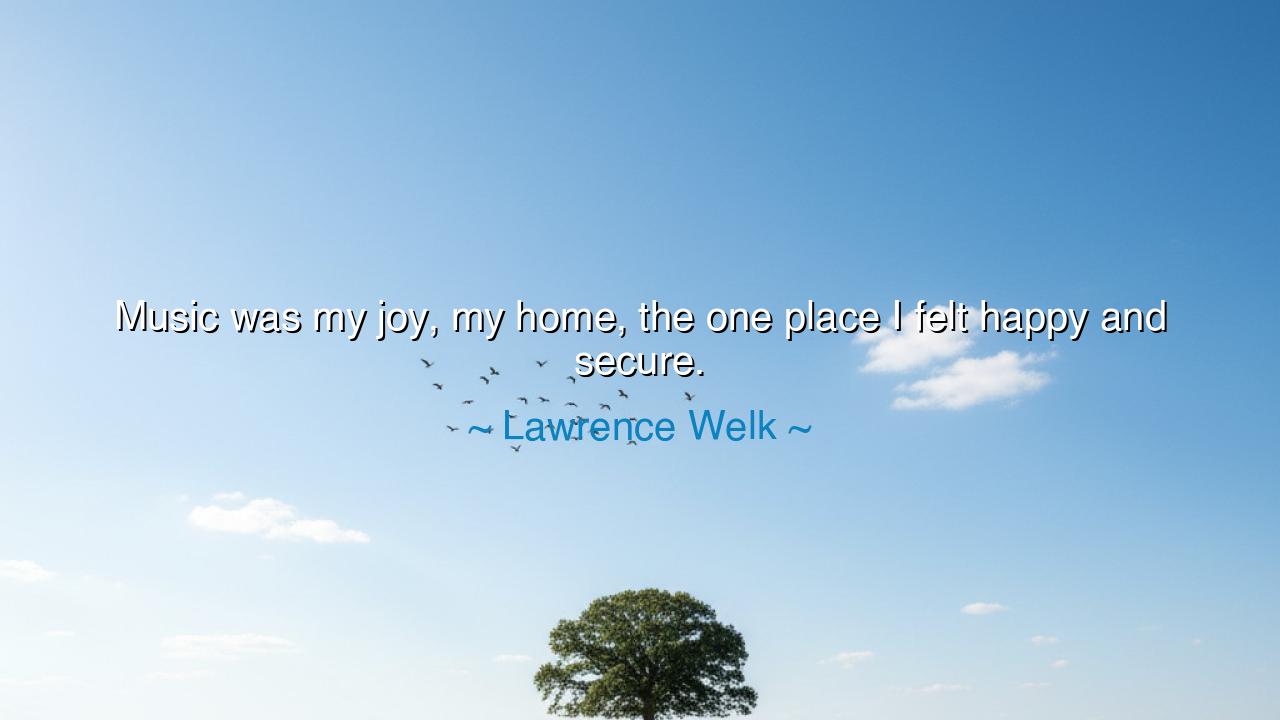
Music was my joy, my home, the one place I felt happy and secure.






In the words of Lawrence Welk, “Music was my joy, my home, the one place I felt happy and secure.” — we hear the voice of a man who found sanctuary not in walls of stone or riches of gold, but in melody itself. His words, soft yet eternal, speak to the universal longing of the human spirit — to find a place where one belongs, where the storms of life cannot reach. For Welk, that place was music — not merely sound or performance, but a living refuge, a hearth for the soul. In these few words lies a truth as ancient as the beating of the human heart: that art, when loved deeply, becomes not just a craft, but a home for the spirit.
Born to a family of humble means in North Dakota, Lawrence Welk was the son of German immigrants who worked the soil with weary hands. His world was one of hard winters and harder labors. Yet from those quiet fields rose the strains of an accordion, its song mingling with the whisper of the prairie wind. That sound — his music — became the bridge between hardship and hope. It carried him from the silence of rural isolation to the brilliance of stage lights, from poverty to purpose. When he said that music was his “home,” he was not speaking in metaphor alone. It was truly the dwelling of his spirit, the one place that gave him identity when the world offered him little else.
This origin of the quote lies not in comfort, but in the ache of longing — the yearning of a man who sought safety in the only place that never turned him away. Many who have walked through loneliness know this truth: that the heart, when denied refuge in the outer world, builds one within. For Welk, that refuge was melody. In every note, he found not escape, but belonging — a sacred communion between his soul and something greater. Music was not a career to him; it was a form of prayer, a dialogue between himself and eternity.
Such a truth is not new to history. Beethoven, in the twilight of his life, deaf and cut off from the world of sound, wrote to a friend: “I will seize fate by the throat; it shall not wholly conquer me.” And though he could no longer hear the music he composed, he continued to write — symphonies that thundered with triumph and tenderness alike. For Beethoven, as for Welk, music was not sound alone but spirit — the one companion that could not betray him, the one home that remained when all others fell away. Through such devotion, both men remind us that the truest forms of art are born not of luxury, but of longing.
To call something your “home” is to grant it sacred meaning. A home is where one’s heart finds rest, where one’s truest self may exist without armor. For some, that home is found in family or faith; for others, in the quiet pursuit of a craft that brings peace. Welk’s declaration reveals that home is not always a place, but a calling — a space of harmony between the inner and outer worlds. He shows us that joy is not merely found, but created, built through the steady devotion to that which makes the soul come alive.
His words also carry a message for those who wander through life seeking fulfillment in fleeting things. The world offers many distractions — wealth, recognition, fleeting pleasures — yet none endure when hardship strikes. But what Lawrence Welk discovered, and what the ancients have always known, is that joy born from creation is joy that lasts. When you cultivate something that springs from your heart — be it song, craft, word, or kindness — it becomes a fortress that no sorrow can breach. The one who creates from love becomes at home in any land, for they carry their peace within.
And so, the lesson of this quote is simple yet profound: find the thing that is your true home, and dwell within it. Seek not only comfort, but meaning. Whether it is music, art, teaching, or tending the earth, pour yourself into that which brings you joy and security. Let your work be not merely a task, but a song — one that shelters you through the cold nights of doubt and the storms of time. For when all else fades, that inner home will remain, radiant and unshaken.
Thus, my children, remember the wisdom of Lawrence Welk: happiness is not found in possessions or places, but in devotion to what you love. Build your home not of brick and wood, but of purpose and passion. Let your joy become your dwelling, your craft your comfort, and your art your altar. In that sacred place, as in the heart of Welk’s music, you will find not only peace — but the truest sense of being alive.






AAdministratorAdministrator
Welcome, honored guests. Please leave a comment, we will respond soon